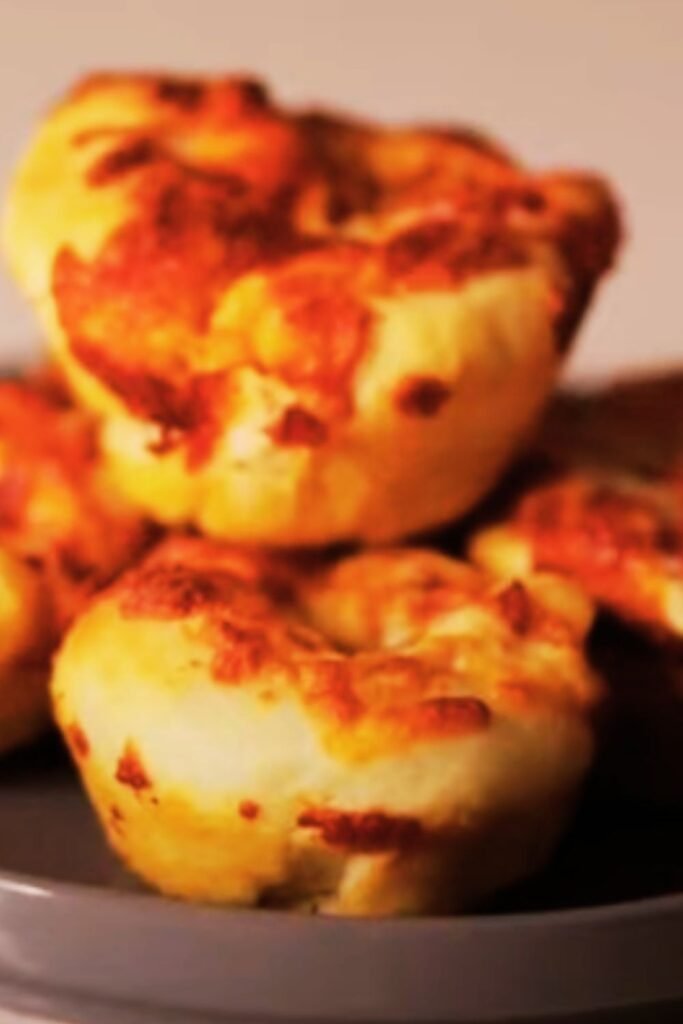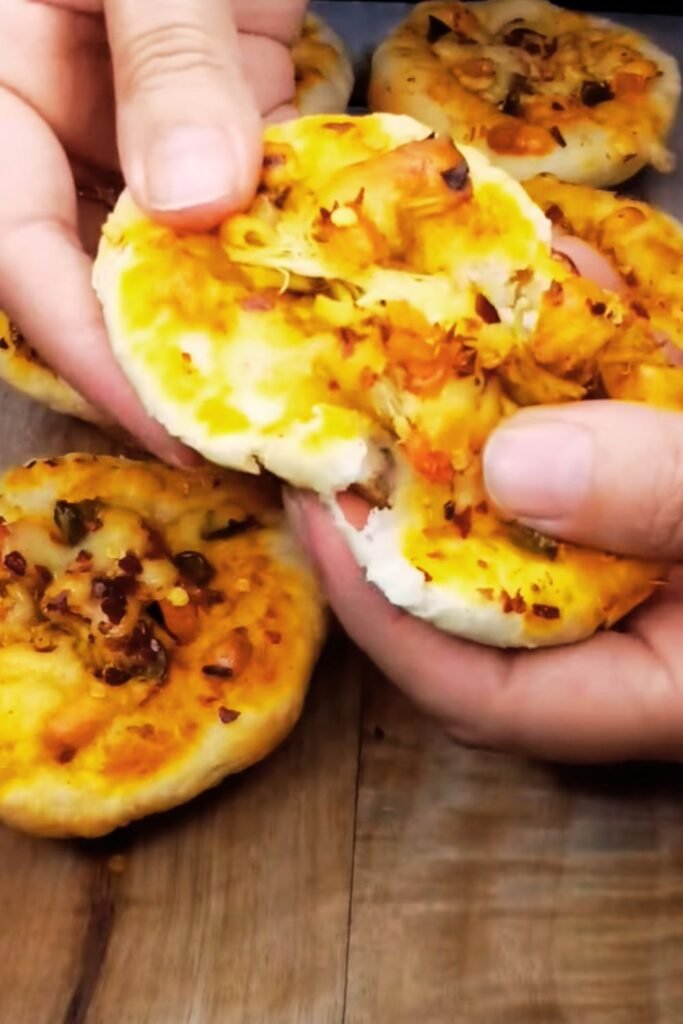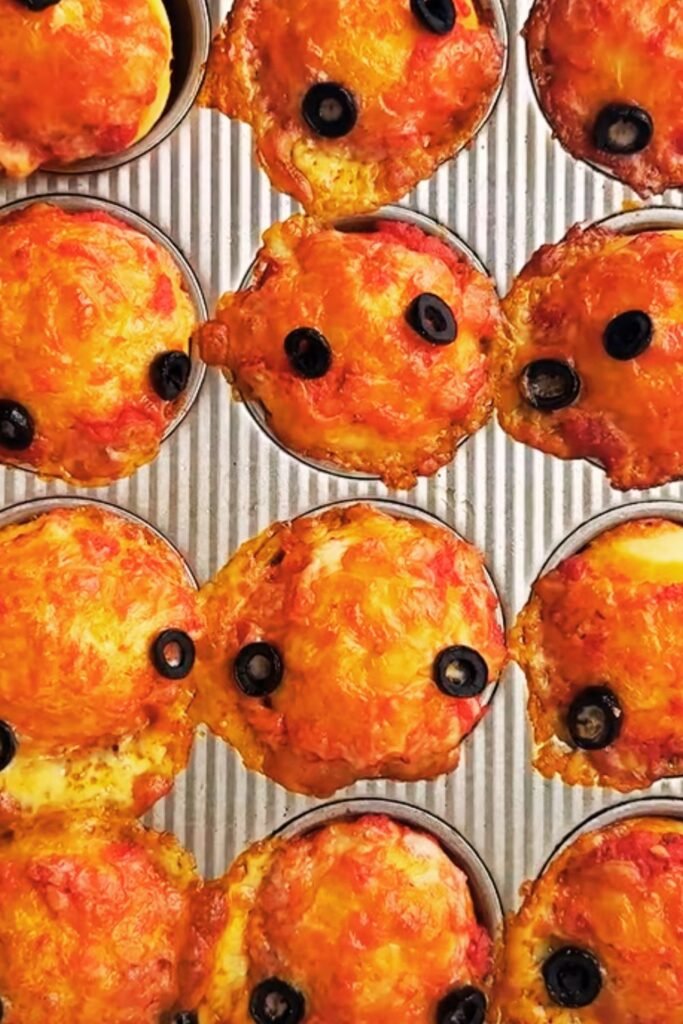When I first discovered pizza muffins, I couldn’t believe how something so simple could be so incredibly satisfying. These delightful little treats combine everything I love about pizza into a convenient, portable format that’s perfect for busy weeknights, lunch boxes, or entertaining guests. After making countless batches and perfecting my technique, I’m excited to share everything I’ve learned about creating these amazing bite-sized wonders.
Pizza muffins are essentially miniature pizzas baked in muffin tins, creating individual portions that are crispy on the outside and wonderfully cheesy on the inside. What makes them so appealing is their versatility – you can customize each muffin with different toppings, they freeze beautifully, and they’re ready in just 20 minutes from start to finish.
What Makes Pizza Muffins Special
The beauty of pizza muffins lies in their simplicity and adaptability. Unlike traditional pizza that requires yeast, rising time, and careful dough handling, these muffins use a basic batter that comes together in minutes. I’ve found that they’re particularly wonderful for families with picky eaters since each person can customize their own muffins with preferred toppings.
Key Terms and Definitions:
Pizza Muffin Base: A savory muffin batter typically made with flour, baking powder, milk, and eggs that serves as the foundation for toppings.
Cheese Pull Factor: The stretchy, melted cheese effect that makes pizza muffins particularly satisfying when eaten hot.
Flavor Layering: The technique of adding ingredients in specific orders to maximize taste impact and prevent sogginess.
Muffin Cup Distribution: The method of evenly dividing batter and toppings among muffin cups for consistent results.
Essential Ingredients for Perfect Pizza Muffins
Creating exceptional pizza muffins starts with selecting the right ingredients. Through my extensive testing, I’ve discovered that certain choices make a significant difference in the final product.
Base Ingredients
The foundation of great pizza muffins begins with quality base ingredients that create structure and flavor:
- All-purpose flour: Provides the essential structure
- Baking powder: Creates the perfect rise and texture
- Salt: Enhances all flavors and balances sweetness
- Italian seasoning: Adds authentic pizza flavor to the base
- Milk: Creates moisture and tender crumb
- Eggs: Bind ingredients and add richness
- Olive oil: Contributes flavor and prevents sticking
Cheese Selection
I’ve experimented with numerous cheese combinations, and the results vary dramatically:
| Cheese Type | Melting Quality | Flavor Profile | Best Use |
|---|---|---|---|
| Mozzarella | Excellent stretch | Mild, creamy | Primary cheese base |
| Cheddar | Good melt | Sharp, tangy | Flavor enhancement |
| Parmesan | Limited melt | Nutty, salty | Topping finish |
| Provolone | Smooth melt | Mild, smoky | Pizza authenticity |
| Monterey Jack | Creamy melt | Mild, buttery | Kid-friendly option |
Sauce Options
The sauce component can make or break pizza muffins. Here are my preferred options:
Traditional Pizza Sauce: Classic marinara with herbs and garlic Pesto: Basil-based for a gourmet twist Barbecue Sauce: Sweet and tangy for BBQ chicken versions Alfredo: Creamy white sauce base Salsa: For Mexican-inspired variations
Step-by-Step Pizza Muffin Preparation

My foolproof method ensures consistent results every time. I’ve refined this process through countless batches, and these steps eliminate common mistakes.
Preparation Steps
- Preheat and Prepare: Set oven to 375°F and generously grease a 12-cup muffin tin
- Mix Dry Ingredients: Combine 2 cups flour, 1 tablespoon baking powder, 1 teaspoon salt, and 2 teaspoons Italian seasoning
- Combine Wet Ingredients: Whisk together 1 cup milk, 2 beaten eggs, and ¼ cup olive oil
- Create Base Batter: Gently fold wet ingredients into dry until just combined
- Add Initial Cheese: Fold in 1 cup shredded mozzarella cheese
Assembly Process
The assembly technique I use prevents soggy bottoms and ensures even distribution:
- Fill muffin cups ⅔ full with batter
- Create small wells in center of each muffin
- Add sauce sparingly – about 1 teaspoon per muffin
- Layer toppings strategically – heavier items first
- Top with additional cheese for golden finish
Baking Guidelines
Proper baking technique ensures perfectly cooked muffins:
- Bake for 18-22 minutes until golden brown
- Check for doneness with toothpick in bread portion
- Cool for 5 minutes before removing from pan
- Serve immediately for best texture
Topping Combinations That Actually Work
Through extensive experimentation, I’ve identified topping combinations that complement rather than compete with each other. The key is balancing moisture content, flavors, and cooking times.
Classic Combinations
Traditional Pepperoni: Pepperoni slices, extra mozzarella, oregano Meat Lovers: Pepperoni, sausage, bacon bits, cheddar blend Veggie Supreme: Bell peppers, mushrooms, onions, olives Margherita: Fresh basil, cherry tomatoes, fresh mozzarella Hawaiian: Canadian bacon, pineapple chunks, mozzarella
Gourmet Variations
BBQ Chicken: Barbecue sauce base, grilled chicken, red onion, cilantro Mediterranean: Pesto base, sun-dried tomatoes, feta, kalamata olives Breakfast Pizza: Alfredo base, scrambled eggs, bacon, cheddar Taco Style: Salsa base, seasoned ground beef, Mexican cheese, jalapeños
Nutritional Information and Dietary Modifications
Understanding the nutritional content helps with meal planning and dietary accommodations.
Standard Pizza Muffin Nutrition
| Nutrient | Per Muffin | Daily Value % |
|---|---|---|
| Calories | 185 | 9% |
| Protein | 8g | 16% |
| Carbohydrates | 22g | 7% |
| Fat | 7g | 11% |
| Fiber | 1g | 4% |
| Sodium | 420mg | 18% |
| Calcium | 180mg | 18% |
Dietary Adaptations
Gluten-Free Version: Replace all-purpose flour with gluten-free flour blend Lower Sodium: Use low-sodium cheese and sauce options Higher Protein: Add protein powder to batter or extra lean meats Vegetarian: Focus on vegetable toppings and quality cheeses Lower Carb: Reduce flour and increase cheese and protein content
Storage and Meal Prep Strategies

Pizza muffins are exceptional for meal prep, and I’ve developed systems that maintain quality and freshness.
Fresh Storage Methods
Room Temperature: Up to 2 days in airtight container Refrigeration: Up to 1 week properly covered Individual Wrapping: Extends freshness and prevents drying
Freezing Techniques
My freezing method preserves texture and flavor remarkably well:
- Cool completely before freezing
- Wrap individually in plastic wrap
- Store in freezer bags with date labels
- Freeze up to 3 months for best quality
- Thaw overnight in refrigerator
Reheating Methods
| Method | Time | Result | Best For |
|---|---|---|---|
| Microwave | 30-60 seconds | Quick, soft | Individual servings |
| Oven | 5-8 minutes at 350°F | Crispy exterior | Multiple servings |
| Toaster Oven | 3-5 minutes | Balanced texture | 1-2 muffins |
| Air Fryer | 2-3 minutes at 350°F | Crispy finish | Small batches |
Troubleshooting Common Issues
Through my pizza muffin journey, I’ve encountered and solved numerous common problems.
Dense or Heavy Muffins
Causes and Solutions:
- Overmixing batter: Mix just until combined
- Too much liquid: Measure accurately and drain wet toppings
- Old baking powder: Replace every 6 months
Soggy Bottoms
Prevention Strategies:
- Drain wet toppings thoroughly
- Use sauce sparingly
- Preheat muffin tin for 2-3 minutes
- Place on lower oven rack
Uneven Cooking
Consistency Techniques:
- Rotate pan halfway through baking
- Check oven hotspots with thermometer
- Use consistent portion sizes
- Don’t overcrowd toppings
Creative Serving Suggestions
Pizza muffins shine in various serving contexts, and I’ve discovered presentations that elevate the experience.
Party and Entertaining Ideas
Pizza Muffin Bar: Set up stations with different bases and toppings Mini Meal Combinations: Pair with salads and vegetable sides Themed Variations: Create Italian, Mexican, or breakfast themes Dipping Sauce Station: Offer marinara, ranch, and garlic butter
Lunch Box Solutions
Pizza muffins solve the school lunch dilemma beautifully:
- Pack with ice packs to maintain food safety
- Include fresh fruit for balanced nutrition
- Add vegetable sticks for crunch and nutrients
- Consider temperature – they’re delicious cold too
Kid-Friendly Modifications

Children absolutely love pizza muffins, and I’ve developed modifications that increase their appeal while maintaining nutrition.
Child-Approved Toppings
Simple Cheese: Just extra mozzarella Pepperoni Classic: Traditional pepperoni and cheese Mini Veggie: Finely diced vegetables they can’t detect Sweet Options: Mild sauce with favorite cheese
Involving Kids in Preparation
Making pizza muffins becomes a fun family activity:
- Let them measure ingredients for math skills
- Allow topping choices for ownership
- Teach kitchen safety through hands-on experience
- Create personalized muffins for each family member
Advanced Techniques and Variations
Once you master basic pizza muffins, these advanced techniques add sophistication and variety.
Professional-Level Tips
Double Cheese Method: Layer cheese in batter and on top Herb Oil Finish: Brush tops with seasoned olive oil Temperature Control: Use oven thermometer for accuracy Texture Contrast: Add crispy elements like toasted breadcrumbs
International Inspirations
Greek Style: Feta, olives, oregano, lemon zest Mexican Variation: Jalapeños, cilantro, pepper jack Indian Fusion: Curry powder, paneer, cilantro French Influence: Herbes de Provence, goat cheese, caramelized onions
Cost Analysis and Budget-Friendly Tips
Understanding costs helps with meal planning and budget management.
Cost Breakdown
| Ingredient Category | Cost Per Batch | Cost Per Muffin |
|---|---|---|
| Base Batter | $2.50 | $0.21 |
| Cheese | $3.00 | $0.25 |
| Sauce | $0.75 | $0.06 |
| Toppings | $2.00 | $0.17 |
| Total | $8.25 | $0.69 |
Money-Saving Strategies
Buy ingredients in bulk when possible Use seasonal vegetables for freshness and value Make homemade sauce in large batches Freeze extras to prevent waste Shop sales and stock up on stable ingredients
Health Benefits and Nutritional Advantages
Pizza muffins offer surprising nutritional benefits when prepared thoughtfully.
Portion Control Benefits
The individual serving size naturally limits overeating while providing satisfaction. Each muffin delivers a complete flavor experience without the temptation to consume multiple slices.
Nutrient Density Opportunities
Vegetable Integration: Easy way to increase daily vegetable intake Protein Content: Cheese and meat toppings provide substantial protein Calcium Source: Significant calcium from dairy ingredients B Vitamin Content: Enriched flour provides essential B vitamins
Seasonal Adaptations
I enjoy adapting pizza muffin flavors to match seasonal ingredients and celebrations.
Spring Variations
Fresh Herb Garden: Basil, oregano, fresh mozzarella Asparagus Special: Blanched asparagus, goat cheese, lemon zest Spring Onion: Scallions, mild cheese, herb oil
Summer Options
Tomato Harvest: Fresh cherry tomatoes, basil, balsamic drizzle Zucchini Blend: Grated zucchini, parmesan, garlic Corn and Pepper: Sweet corn, bell peppers, jalapeños
Fall Favorites
Butternut Squash: Roasted squash, sage, fontina cheese Apple and Bacon: Thinly sliced apples, bacon, sharp cheddar Pumpkin Spice: Pumpkin puree in batter, warming spices
Winter Comfort
Root Vegetable: Roasted carrots, parsnips, gruyere Brussels Sprouts: Shaved sprouts, pancetta, parmesan Comfort Classic: Extra cheese, hearty meats, rich sauce
Questions and Answers
Q: Can I make pizza muffins ahead of time for a party?
Absolutely! Pizza muffins are perfect for advance preparation. I recommend baking them the day before your event, then storing them covered at room temperature. About 30 minutes before serving, warm them in a 350°F oven for 5-8 minutes. This method maintains their texture while ensuring they’re perfectly heated through.
Q: What’s the best way to prevent pizza muffins from sticking to the pan?
I’ve found that generous greasing is essential, but my secret weapon is using paper muffin liners. However, if you prefer the direct-contact crispy bottom, spray each cup thoroughly with cooking spray, then dust lightly with grated parmesan cheese. This creates a non-stick surface while adding flavor.
Q: Can I substitute different types of milk in the recipe?
Yes, milk substitutions work beautifully! I’ve successfully used almond milk, oat milk, and even buttermilk. Buttermilk creates an especially tender texture, while plant-based milks work well for dairy-free versions. Just ensure the milk is at room temperature for better mixing.
Q: How do I know when pizza muffins are perfectly done?
The visual cues I look for are golden-brown tops and slightly pulled-away edges. For accuracy, insert a toothpick into the muffin portion (not through toppings) – it should come out with just a few moist crumbs. The internal temperature should reach 200°F for food safety.
Q: What’s the maximum number of toppings I can add without affecting the structure?
Through extensive testing, I’ve learned that 3-4 tablespoons of total toppings per muffin is the sweet spot. More than this can cause overflow and uneven cooking. If you want lots of variety, focus on flavorful ingredients rather than quantity.
Q: Can I make mini pizza muffins instead of regular size?
Mini pizza muffins are adorable and perfect for appetizers! Use a 24-cup mini muffin tin, reduce baking time to 12-15 minutes, and fill cups only ½ full. They’re excellent for parties and portion control.
Q: How can I make pizza muffins spicier without overwhelming kids?
My strategy is creating two batches or using the “half and half” method. Add mild jalapeños or red pepper flakes to adult portions while keeping plain versions for sensitive palates. You can also serve hot sauce on the side for customization.
Q: What should I do if my pizza muffin batter seems too thick?
If the batter is difficult to stir or seems dry, add milk one tablespoon at a time until you achieve a thick but spreadable consistency. The batter should be thicker than pancake batter but not as stiff as cookie dough.
Q: Can I freeze the unbaked batter with toppings?
I don’t recommend freezing unbaked batter as the texture changes significantly. However, you can prepare the dry ingredients in advance and store them in an airtight container. When ready to bake, just add the wet ingredients and proceed with the recipe.
Q: Why do my pizza muffins sometimes have a bitter aftertaste?
Bitterness usually comes from too much baking powder or baking powder that’s lost its potency and turned bitter. Use exactly the amount specified in the recipe and replace your baking powder every six months. Also, avoid overmixing, which can develop bitter compounds in the flour.
Pizza muffins have transformed my approach to quick, satisfying meals. They represent the perfect intersection of convenience, flavor, and creativity. Whether you’re feeding a hungry family, preparing for a party, or looking for meal prep solutions, these versatile little treats deliver every time. The beauty lies not just in their delicious taste, but in their ability to bring people together around the simple joy of personalized, handheld pizza perfection.
Start with the basic recipe I’ve shared, then let your creativity guide you toward your own signature variations. Remember, the best pizza muffins are the ones that make you and your loved ones smile with every bite.